イベント&アクティビティ
DIJ researchers teach courses on Japan and Germany in the pandemic
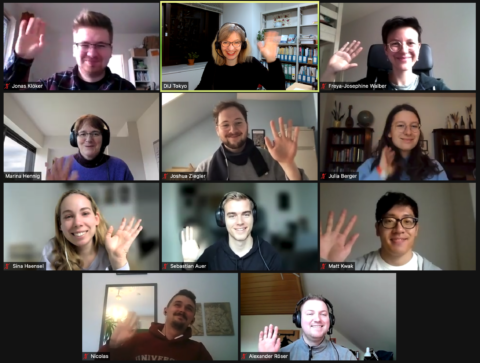 As part of a new cooperation between the DIJ and Johannes Gutenberg University Mainz, DIJ deputy director Barbara Holthus and principal researcher Markus Heckel taught two courses in the University’s Q+ study programme. Within the unit “Japan and Germany during the Sars-CoV2 Pandemic”, Barbara co-taught the course ‘Family Life in the Pandemic: Comparing Germany and Japan’ (with Marina Hennig, Mainz) focusing on how the pandemic and the regulations to contain it have affected family life in both countries. Together with Philipp Harms (Mainz), Markus co-taught the course ‘Monetary Policy and Fiscal Policy-Responses to the Covid-19 Pandemic in Japan and Germany’. Their course focused on the monetary policies of the Bank of Japan and of the European Central Bank as well as on programmes by the fiscal authorities in Japan and Germany since the beginning of the pandemic. Both courses were received well by the interdisciplinary group of students. Further teaching and research cooperation activities are planned for 2022.
As part of a new cooperation between the DIJ and Johannes Gutenberg University Mainz, DIJ deputy director Barbara Holthus and principal researcher Markus Heckel taught two courses in the University’s Q+ study programme. Within the unit “Japan and Germany during the Sars-CoV2 Pandemic”, Barbara co-taught the course ‘Family Life in the Pandemic: Comparing Germany and Japan’ (with Marina Hennig, Mainz) focusing on how the pandemic and the regulations to contain it have affected family life in both countries. Together with Philipp Harms (Mainz), Markus co-taught the course ‘Monetary Policy and Fiscal Policy-Responses to the Covid-19 Pandemic in Japan and Germany’. Their course focused on the monetary policies of the Bank of Japan and of the European Central Bank as well as on programmes by the fiscal authorities in Japan and Germany since the beginning of the pandemic. Both courses were received well by the interdisciplinary group of students. Further teaching and research cooperation activities are planned for 2022.
Nora Kottmann gives online talk on methods in Area Studies
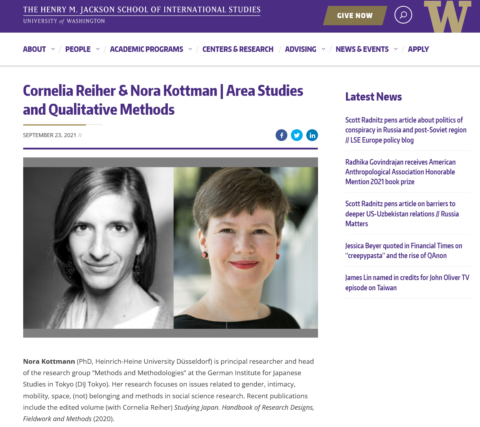
Recent years have seen a growing demand for more systematic and transparent research practices in Area Studies. Based on their recently edited handbook Studying Japan, a comprehensive guide on qualitative methods, research designs, and fieldwork in social science research on Japan, DIJ principal researcher Nora Kottmann and co-editor Cornelia Reiher (FU Berlin) will discuss the role and potential of qualitative methods for Area Studies in the QUAL Speaker Series at the University of Washington. In their online talk on December 1, 12.20 pm (PST)/December 2, 5.20 am (JST), they will outline general discussions, give concrete examples, and introduce recent developments and trends. Details and registration here
Conference on German-East Asian entanglements in Social Sciences
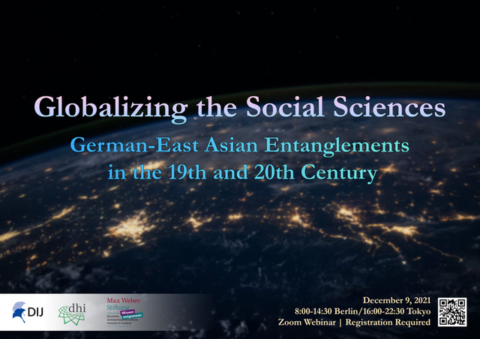
At the end of the nineteenth century, Germany was widely recognized as the premier place to study political economy, law, and social sciences as summarized under the term Sozialwissenschaften. With its relatively state-centric perspectives and a tendency to grasp society in the context of the interplay of institutional, economic, and psychological factors, the German Sozialwissenschaften significantly influenced elites from the so-called “catch-up countries” such as Russia, Japan, China, and Southern Europe. As a consequence it became the standard reference for scholars from these countries, in some cases even until after World War Two. Focusing on the multinational personal links and multi-fold intellectual entanglements in the context of the globally rising theoretical quest for connections and correlations of empirical facts, this one-day online conference will reexamine the legacies and pitfalls left behind by the German Sozialwissenschaften in East Asia from historical and transnational perspectives. Details and registration here
DIJ researchers and alumni at VSJF disciplinary sections’ meeting
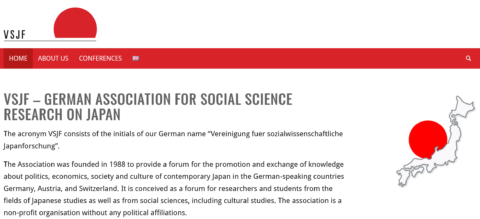
Several DIJ researchers and alumni will present, moderate, and discuss latest research on Japan in disciplinary sections of the German Association for Social Science Research on Japan (VSJF) on November 20. Among others, DIJ alumna Carola Hommerich (Sophia University) will present her co-authored paper “Impact of COVID-19 Pandemic on Household Income and Mental Well-Being: Evidence from a Panel-Survey in Japan” in the section Sociology and Social Anthropology. This section is co-convened by Carola, together with DIJ researchers Nora Kottmann and Celia Spoden. DIJ alumni Katharina Dalko and Sebastian Hofstetter (both Halle-Wittenberg University) will give their paper “Technical innovations in the health care sector: Challenges and risks of co-creative approaches using the example of the project DigiVid19” in the Technology section which is convened by DIJ researcher Susanne Brucksch and DIJ alumna Cosima Wagner (FU Berlin). Further section meetings include Economics, convened by DIJ alumnus Harald Conrad (Dusseldorf University), and Culture and Media, organized by DIJ alumna Elisabeth Scherer (Dusseldorf University). The complete programme (in German) is available here
Talk by David M. Malitz on Chinese and Japanese Medical Diplomacy in Thailand
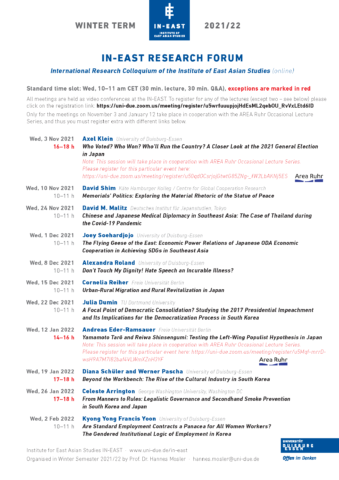
DIJ senior research fellow David M. Malitz will be the next speaker in the IN-EAST Research Forum Lecture Series at the University of Duisburg-Essen on November 24. His online talk “Chinese and Japanese Medical Diplomacy in Southeast Asia: The Case of Thailand during the Covid-19 Pandemic” will compare Chinese and Japanese medical diplomacy in Thailand and attempt a first analysis of their reception by the Thai public. The last decade saw an intensifying competition for influence between the People’s Republic of China and Japan in Southeast Asia. Since the outbreak of the Covid-19 pandemic, this rivalry has extended to the field of medical or health diplomacy, the donation of equipment, drugs and especially vaccines. Thailand offers an interesting case study in this regard as the kingdom enjoys close relations with both China and Japan. Details and registration here
Film screening and discussion with filmmaker Thomas Ash: ‘Ushiku’ – fully booked –
 In cooperation with the Friedrich-Ebert-Foundation and the OAG Tokyo, the DIJ organizes a special preview screening of the film Ushiku on November 19, ahead of its Japan theatrical release. The screening at the OAG House Tokyo will be followed by a discussion with director Thomas Ash, several protagonists, and human rights expert Ai Kihara-Hunt (University of Tokyo). The film takes viewers deep into the psychological and physical environment inhabited by foreign detainees in one of the largest immigration centres in Japan. On the eve of Japan’s recent immigration reform efforts, the director bypasses the media blackout the government has imposed on its immigration centres, bringing viewers into immediate contact with the detainees, many of whom are refugees seeking asylum. The event will be moderated by DIJ principal researcher Nora Kottmann. Please note: Due to the COVID-19 pandemic special rules for attendance apply. This event is fully booked. We regret that registration is no longer possible. Details here
In cooperation with the Friedrich-Ebert-Foundation and the OAG Tokyo, the DIJ organizes a special preview screening of the film Ushiku on November 19, ahead of its Japan theatrical release. The screening at the OAG House Tokyo will be followed by a discussion with director Thomas Ash, several protagonists, and human rights expert Ai Kihara-Hunt (University of Tokyo). The film takes viewers deep into the psychological and physical environment inhabited by foreign detainees in one of the largest immigration centres in Japan. On the eve of Japan’s recent immigration reform efforts, the director bypasses the media blackout the government has imposed on its immigration centres, bringing viewers into immediate contact with the detainees, many of whom are refugees seeking asylum. The event will be moderated by DIJ principal researcher Nora Kottmann. Please note: Due to the COVID-19 pandemic special rules for attendance apply. This event is fully booked. We regret that registration is no longer possible. Details here
Franz Waldenberger moderates digital currencies panel at virtual GoN-summit

DIJ director Franz Waldenberger will moderate the panel “Digital Currencies – European and Japanese Initiatives” at the Group of Nations ‘Solutions through Inclusivity’ virtual summit on November 17. Together with panelists Andrea Pinna (ECB), Jonas Gross (Frankfurt School Blockchain Center), Hiromi Yamaoka (Future Corporation), and Nobuyuki Kinoshita (Tokyo Financial Exchange), he will discuss how digital currencies are changing the future of financial systems in the digital age. The panel will introduce major findings of the open access book publication The Future of Financial Systems in the Digital Age: Perspectives from Europe and Japan, edited by Markus Heckel and Franz Waldenberger. It is forthcoming from Springer Singapore in 2022 and contains chapters by leading scholars, policymakers, and regulators from Japan and Europe, including the editors as well as panelists Jonas Gross, Hiromi Yamaoka, and Nobuyuki Kinoshita. Registration for the virtual summit is open here
Joint book exhibition ‘World Heritage in Japan’ in October
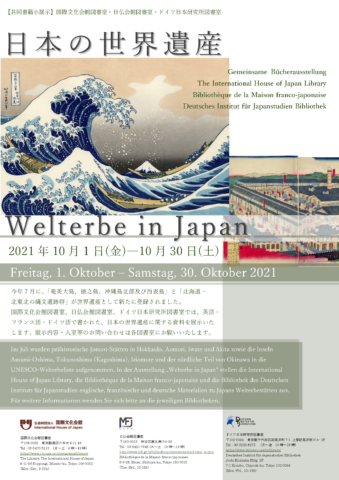 Japan is home to no less than 25 UNESCO World Heritage sites, including Himeji Castle, Hiroshima Peace Memorial, and Mount Fuji. In July, two new sites in Japan were added to this list: the first comprises Amami-Oshima Island, Tokunoshima Island, northern part of Okinawa Island, and Iriomote Island (Kagoshima and Okinawa prefectures); the second are Jomon Prehistoric Sites in Northern Japan (Hokkaido, Aomori, Iwate, and Akita prefectures). In this year’s joint autumn book exhibition, the International House of Japan Library, the Bibliothèque de la Maison franco-japonaise , and the DIJ’s library are displaying English, French, and German materials on Japan’s World Heritage sites. The exhibition takes place from October 1st to October 30th. For further information, please contact each library. Details here
Japan is home to no less than 25 UNESCO World Heritage sites, including Himeji Castle, Hiroshima Peace Memorial, and Mount Fuji. In July, two new sites in Japan were added to this list: the first comprises Amami-Oshima Island, Tokunoshima Island, northern part of Okinawa Island, and Iriomote Island (Kagoshima and Okinawa prefectures); the second are Jomon Prehistoric Sites in Northern Japan (Hokkaido, Aomori, Iwate, and Akita prefectures). In this year’s joint autumn book exhibition, the International House of Japan Library, the Bibliothèque de la Maison franco-japonaise , and the DIJ’s library are displaying English, French, and German materials on Japan’s World Heritage sites. The exhibition takes place from October 1st to October 30th. For further information, please contact each library. Details here





 Open Access
Open Access
